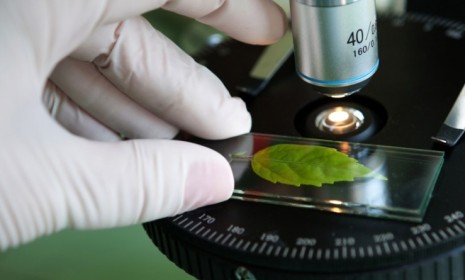Why conservatives increasingly distrust science: 4 theories
The Right has far less faith in the conclusions of scientists than it did in the 1970s. What's making conservatives so skeptical?

A free daily email with the biggest news stories of the day – and the best features from TheWeek.com
You are now subscribed
Your newsletter sign-up was successful
One of the big losers this election year? Science. Only 35 percent of conservative voters have "a great deal of trust in science," according to a new study by Gordon Gauchat, a University of North Carolina sociologist. By comparison, 48 percent trusted science as a discipline in a 1974 survey. What accounts for the dramatic decline? Here, four theories:
1. Science has become politicized
Forty years ago, says Red Orbit, the media and educators spotlighted scientific achievement that all Americans could be proud of, like space exploration and defense. Today, those who promote scientific data are often pushing partisan policies on climate change and the environment. You can see why many Republicans are increasingly wary, Jim DiPeso, policy director of Republicans for Environmental Protection, tells the Los Angeles Times. They think that science is being used to support "bigger government and more onerous regulation."
The Week
Escape your echo chamber. Get the facts behind the news, plus analysis from multiple perspectives.

Sign up for The Week's Free Newsletters
From our morning news briefing to a weekly Good News Newsletter, get the best of The Week delivered directly to your inbox.
From our morning news briefing to a weekly Good News Newsletter, get the best of The Week delivered directly to your inbox.
2. The Right feels like it's under siege
"The perception among conservatives is that they're at a disadvantage, a minority," Gauchat tells U.S. News & World Report. "It's not surprising that the conservative subculture would challenge what's viewed as the dominant knowledge production groups in society." That explains why conservatives are challenging not only scientists, but the media, too.
3. Conservatives trust science, but not scientists
Conservatives are not a "bunch of undereducated yahoos," says Kevin Drum at Mother Jones. Indeed, politicians on the Right are not saying that we should "simply ignore science" and trust, say, our intuition on issues such as climate change, says John Timmer at Ars Technica. They just "claim that the science has been manipulated." Trust facts, trust science — but don't trust the scientists who spin results to justify liberal policy positions.
A free daily email with the biggest news stories of the day – and the best features from TheWeek.com
4. Conservatives are creating their own reality
The distrust in science "has been led by the most educated, most engaged segment of conservatism," notes Drum, suggesting that it's "part of the wider conservative turn" against institutions — academia, the media, Hollywood — that are "perceived as too liberal." Instead, conservatives increasingly favor "institutions that produce more reliably conservative narratives" — like "churches, business-oriented think tanks, Fox News." These days, partisans on both sides seek out information that reinforces their existing beliefs. "Liberals and conservatives are almost literally living in different worlds with different versions of consensus reality."
-
 The ‘ravenous’ demand for Cornish minerals
The ‘ravenous’ demand for Cornish mineralsUnder the Radar Growing need for critical minerals to power tech has intensified ‘appetite’ for lithium, which could be a ‘huge boon’ for local economy
-
 Why are election experts taking Trump’s midterm threats seriously?
Why are election experts taking Trump’s midterm threats seriously?IN THE SPOTLIGHT As the president muses about polling place deployments and a centralized electoral system aimed at one-party control, lawmakers are taking this administration at its word
-
 ‘Restaurateurs have become millionaires’
‘Restaurateurs have become millionaires’Instant Opinion Opinion, comment and editorials of the day